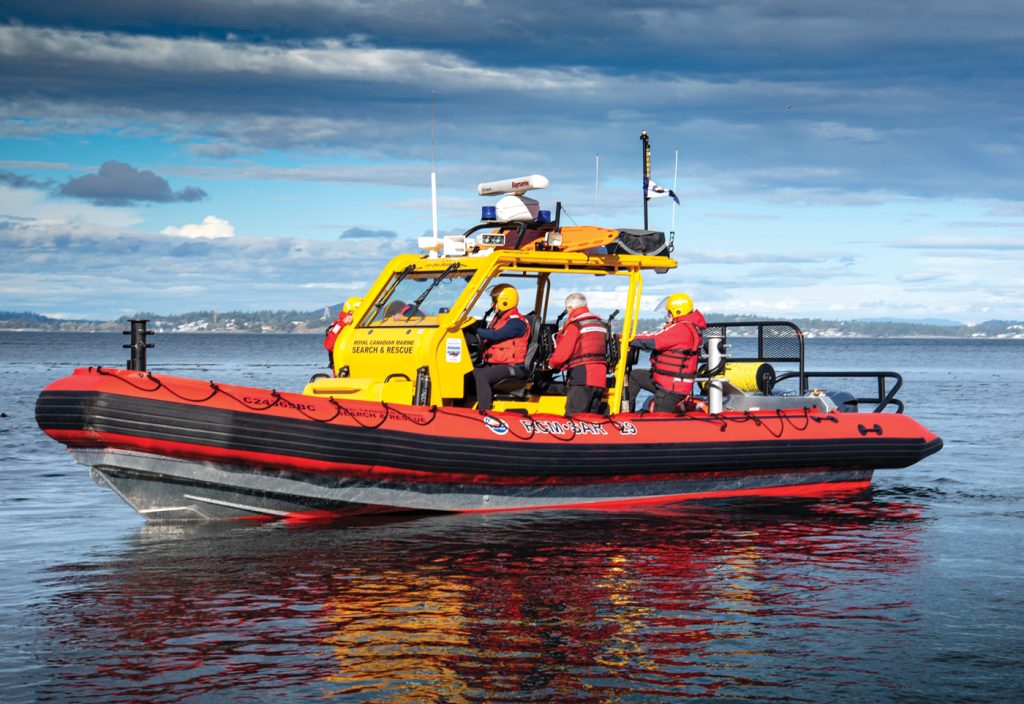Military volunteers perfect fit for RCMSAR
By Lookout on May 30, 2021 with Comments 1
Peter Mallett
Staff Writer
––
At the helm of the Royal Canadian Marine Search and Rescue (RCMSAR) is a retired naval officer.
Captain (Navy) (Retired) Bill Riggs’ familiarity with the ocean coupled with his navy training provides the expertise to lead the more than 900 search and rescue volunteers.
They operate 44 specialized rescue vessels and 32 marine rescue stations, and are on call 24 hours a day, seven days a week to help the coast guard and military keep watch on 450,000 square kilometres of the Pacific coastline and inland lakes and waterways in British Columbia.
“We have the resources, people, and assets on the water and are available to support the Canadian Coast Guard, the Canadian Armed Forces, and the Province when we are needed,” says Riggs, RCMSAR Chief Executive Officer. “Many of our volunteers are also heavily involved in other activities within their communities.”
Through an agreement with the Canadian Coast Guard, RCMSAR can be called out to marine emergencies by the Joint Rescue Coordination Centre located at CFB Esquimalt.
Persons in medical distress, collisions, onboard fires, mechanical failures, boats taking on water, and missing persons are some of the marine emergencies volunteers tackle. They conduct, on average, one-third of all marine rescues each year.
The non-profit was founded in 1978 as the Canadian Coast Guard Auxiliary – Pacific. It was re-branded in B.C. in 2012 to highlight its crews are volunteers.
Since 1996, they have responded to more than 2,814 SAR taskings and assisted more than 1,966 individuals, recording over 370,000 volunteer hours in British Columbia.
“The strength of any non-profit is in its volunteers and they are what makes our operation so successful,” he says. “Our strong ties to the military through our membership are also quite remarkable.”
RCMSAR’s volunteers come from all walks of life including current-serving military and veterans who make a seamless transition to RCMSAR.
“Military members seem to be a perfect fit for our organization because they bring with them their willingness to work under pressure, in a team, and deploy and respond to any scenario whatever it might be.”
Riggs says the public and navy are mostly unaware of RCMSAR and it’s something he is working hard to change.
“The work we do is vitally important, and I want to raise awareness of our organization to a higher level within the naval community,” he says. “This organization is a perfect fit for current serving members and also folks like me who have retired and have the time to share our knowledge with other SAR volunteers.”
To learn more about RCMSAR email info@rcmsar.com or visit the website https://rcmsar.com/
––
A tale of two rescues
Peter Mallett
Staff Writer
––
Two men with ties to the Royal Canadian Navy have a few yarns to tell about their work as volunteers with the Royal Canadian Marine Search and Rescue.
SLt Ilya Chudakov, a 39-year-old Marine Systems Engineer with HMCS Winnipeg, and Earle Shirley, a 68-year-old retiree who previously served 28 years in the navy mostly as a reservist, both volunteer at RCMSAR’s Victoria Rescue Station, located at Ogden Point
Back in 2015, a large wave toppled a scuba diving club’s boat sending nine divers into the water off Race Rocks.
A worker at a nearby lighthouse saw the boat capsize and immediately put out a call to the Canadian Coast Guard via the Joint Rescue Coordination Centre.
Shirley and team were dispatched.
“We worked with a vessel from our [RCMSAR] sister station in Sooke to rescue all nine divers in extremely rough sea conditions,” he says.
When they arrived on the scene some of the divers had climbed on to the overturned boat, others were hanging on. Due to rough seas, it was too dangerous to come alongside the overturned vessel; so they were forced to throw a line and pull each diver to safety. They were suffering from mild hypothermia and sea sickness but the RCMSAR team was able to bring them ashore at nearby Pedder Bay where they received medical treatment.
SLt Chudakov recalls a SAR operation four years ago that was a “valuable learning experience” in handling a tense situation.
It began with an urgency call from a sailboat proceeding under power near the Ogden Point lighthouse. Winds were light and the seas calm, he remembers.
The boat had broken down in a narrow and busy channel between the sea terminal and seaplane runway.
SLt Chudakov was part of a RCMSAR team that came alongside the stricken vessel. It was Shirley, serving as the boat’s coxswain, who communicated with both the sailing vessel and Victoria Coast Guard radio on how to proceed. The occupants of the boat grew rapidly impatient and upset about the delay, but Shirley defused the situation with his calm composure.
Operators of the boat were eventually able to regain power and the sailboat made its way safely to port. SLt Chudakov says it wasn’t the nature of the call that stuck with him, but more importantly the lesson learned in terms of remaining calm and following the necessary procedures no matter what the circumstances or how frantic those are at the scene.
––––
Filed Under: Top Stories
About the Author:







The organization was called the Canadian Marine Rescue Auxiliary (CMRA) when it was first forming, starting in the mid-1970s as an outgrowth of the CCG (est. early 1960s) Volunteer Marine Rescue Agent program (VMRA). The Auxiliary rebranded as the CCGAux in 1997. The western most division rebranded at RCMSAR starting in 2015.